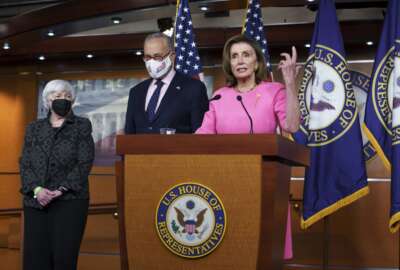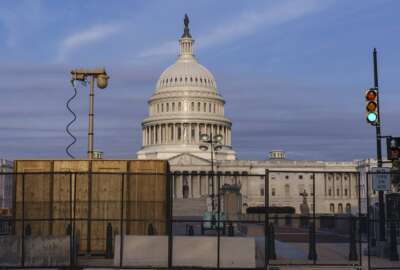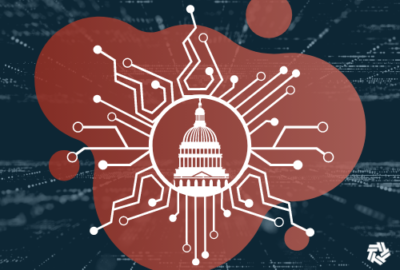
Hubbard Radio Washington DC, LLC. All rights reserved. This website is not intended for users located within the European Economic Area.
Hubbard Radio Washington DC, LLC. All rights reserved. This website is not intended for users located within the European Economic Area.
You need a scorecard for the legislative shenanigans going on on Capitol Hill this week.
Best listening experience is on Chrome, Firefox or Safari. Subscribe to Federal Drive’s daily audio interviews on Apple Podcasts or PodcastOne.
You need a scorecard for the legislative shenanigans going on on Capitol Hill this week. The agenda looks like nothing so much as a game of Chinese checkers. Weighing in with his take on the odds of a shutdown, WTOP Capitol Hill correspondent Mitchell Miller joined Federal Drive with Tom Temin.
Interview transcript:
Tom Temin: And they are tying a lot of things into this wonderful Baroque mechanism. What can we expect now?
Mitchell Miller: Wow, there is so much going on! As you know, of course, we had the Office of Management and Budget telling agencies last week to prepare for any kind of contingency, as we know that standard practice for OMB. And while we’ve had several shutdowns over the past decade, this one could be different since we’ve never had one obviously during a pandemic. Dr. Anthony Fauci has said this would be the worst time in the world to have a shutdown with 140,000 people a day still getting inffected, a lot of people in businesses still just starting to recover from all the economic problems linked to the pandemic. And then you have complications related to the fact that parts of the Centers for Disease Control and Prevention and the NIH could be affected by these funds running out. Right now, it does not look good, because we’re going to get a vote later today in the Senate on the House-passed bill, the short term resolution that normally we think of “Okay, well, they’re going to do it again, they’re going to roll over another stopgap measure.” But as we both know, Republicans have made it very clear, they are not going to vote for this because of the extension of the debt limit provision included by Democrats in this short term spending bill, which of course also includes natural disaster aid, as well as money for relocating Afghans. But of course, the key matter related to right now is whether or not there is going to be a shutdown. So tonight, the Republicans will filibuster this, and it will go down, and then we’ll have to see, where do we go next? Right now it’s looking like there will be a shutdown, at least temporarily. But of course, we still have a few days to work things out till the end of the week. So we’ll have to see what happens. But it is not looking good right now with both sides. So dug in so deeply on this issue of extending the budget deficit.
Tom Temin: Because the bill that the House put forward last week for a continuing resolution was to take the government through, I think, Dec. 1. What about the idea of just a-day-at-a-time types of CR’s? There’s some precedent for that also.
Mitchell Miller: Right, they could do that. And I think they’re gonna have to get especially creative this time, because there is no indication that Senate Minority Leader Mitch McConnell and Republicans are going to give in on this. I think, at one point, Democrats were kind of hopeful that maybe Republicans would cave. But it’s been pretty consistent over the last several weeks and even months, really, that the Republicans were not going to give in on this issue. So it really then falls to the Democrats. What are they going to do? Are they going to try to, as you mentioned, go one day at a time and try to pull this out? There have been some negotiations, actually, between Republicans and Democrats, some of the longer term, people trying to get some kind of agreement that maybe we can just take this deficit part of things out and work on it, while we move toward reaching that basic confrontation, really, if you will, because they do have time that you know it could – Treasury Secretary Janet Yellen has said they have basically until roughly mid October. But as we both know, the closer we get to the federal government literally running out of money on its credit card, the more nervous the markets get. And as we saw about a decade ago, when we got to the brink, it caused a lot of economic problems, even though we never actually reached that point.
Tom Temin: We’re speaking with WTOP Capitol Hill correspondent Mitchell Miller. I guess underlying all this is the fact that there are so many interlocking bills. You’ve got the bipartisan infrastructure, then you’ve got the $3- $4- $5 trillion infrastructure. But yet, it seems like there’s more agreement on the basic funding of the government, the normal budget, than there is on the rest of it.
Mitchell Miller: Yeah, that’s – I know, that’s the real irony here is that there is generally a consensus that no, we don’t want to default on the debt limit. We want to move ahead, we have to keep the government running. But as always is the case, it’s the politics and they’re just playing both sides of this. And then when we look at the larger matters in connection with the – if we can actually say it’s the larger matters, but the fact that we have the bipartisan infrastructure bill, as well as the so-called human infrastructure bill, the fact that all of this is taking place, even some of the longtime lawmakers who have been here for decades say they really can’t remember a confluence of this many complicated factors all happening at once. You know, we often go through the wringing of hands on these shutdown situations and then say, well, things will get worked out or it’ll get worked out on the debt limit. But when you also have people working on so many other different things related to the $3.5 trillion or whatever it turns out to be, along with a $1 trillion bipartisan infrastructure bill, all of these things, trying to – Democratic leaders trying to get them all to happen this week, it’s really, really a complicated situation. And I think the danger is that it can cause some of the leadership to get their eye off the ball. Because as we’ve been pressing lawmakers over the last several weeks, they really don’t necessarily, at least publicly say that they have a plan B for all of this. And that’s what’s a little bit disconcerting as we move toward this deadline.
Tom Temin: Because you keep hearing that this issue of disagreement among this constituent group, or that one, that group, this group of Democrats versus that group of Democrats, is a real problem for leadership. But maybe that’s wrong? Maybe the leadership is a problem for the rank and file?
Mitchell Miller: Right, because the rank and file frankly, has been pretty consistent. I mean, let’s take a look at the Democrats, for example, with the moderates and progressives, which have been going back and forth. And of course, understandably, that’s received a lot of attention. But really, if you look at their positions, they have been fairly consistent over the last several weeks and months. The moderates saying, “We want to stick to getting this bipartisan infrastructure bill passed. It’s something that both parties can agree to, for the most part. “It’s a win for President Biden, why not get that done?” The progressives on the other side, while there’s been a little more wiggle room there in connection with it. Pramila Jayapal, who heads the Progressive Caucus has said, look, we’ve stuck with this $3.5 trillion figure for a long time, we’ve said, these are our priorities. We’ve made that very clear to House Speaker Nancy Pelosi. And we know that House Speaker Pelosi is very good at turning around things and getting the votes that she needs. And she doesn’t want to put things on the floor unless she knows that the votes are there. Much in the same way, obviously on the Democratic side, that Senate – when he was Senate Majority Leader Mitch McConnell has operated they are both very canny and parliamentarian. So it’s interesting to see that the Democratic leadership has had some real trouble wrangling all of this together. Because, for example, just the fact that the Democrats have not really wanted to talk about that top line figure much beyond the $3.5 trillion, because it’s really become clear that that figure is not going to hold. But nobody actually wants to put out another number out there, even though they were working over the weekend, the House Budget Committee marking things up, but there’s so many moving parts related to that legislation that it’s much different than a normal markup, because you’re effectively marking up something that you don’t know what the final cost of the whole legislation is.
Tom Temin: Yeah. And most people wouldn’t run anything else in their private lives that way. So even members of Congress, some of them at least at some point say, well, maybe I shouldn’t sign on to this? So the irony here, there’s a little bit more unanimity on the Republican side at the moment than on the Democratic side?
Mitchell Miller: Right. And they almost seem to relish the fact that they are being – sitting on the sidelines related to this, because what they have been trying to do politically, at least for the last several weeks, is just say, you know what, we’re going to make our position very clear on the debt limit, they’re not going to support it. And they are just going to effectively what they hope, politically is to watch the Democrats crash and burn on this. Now on the other side, Senate Majority Leader Schumer and House Speaker Pelosi last week held a news conference together along with the Treasury secretary, and they tried to project calm. Literally, House Speaker Pelosi says normally people get all antsy about all of this stuff. But I tried to stay calm, because I know this is how it all happens. But I think that was part of a messaging effort to the rank and file because earlier in the week last week, there was a lot of nervousness here on the Hill and a lot of discussion about what happens if all of this just completely falls apart? Because of course, if this does not fully get through on the Democratic side, then this is really the last chance for President Biden to get any of this major, huge massive spending plan through because if it dies in the next week or so there’s really no chance politically that they can bring that back from the brink.
Tom Temin: And by the way, is there a fence still around the Capitol? It was down and up again and down again. What’s the status?
Mitchell Miller: Well, here at the Capitol, it’s really nice to see that the fence went down very quickly. After the rally, which only drew a few 100 people – I was actually there, not this past weekend, but the weekend before. And it was interesting to see just, very small group there with this huge presence of Capitol Police and all the other law enforcement agencies and that fence. Actually they put up a fence around the U.S. Supreme Court as well which they did not do after Jan. 6, but all of that fencing as promised by the U.S. Capitol Police Chief Tom Manger came down starting on Sunday. And by the time people came into work a week ago, it was all gone. So it’s been interesting to see that the Capitol in some respects, despite all these very different things going on right now has a sense of normalcy to a certain extent because the fencing is no longer here. The fact that you have both chambers back and you do have House members required to wear masks along with staff and members of the media. Not so the case on the Senate side, although they do generally wear masks. So you still feel the impact of the pandemic here for sure in the Capital. But given the fact that we have all of the lawmakers back it does seem a little bit more normal. That aside from all the things that we just talked about, with the trillions of dollars ready to either implode or explode, depending on your point of view.
Tom Temin: All right. Well, when you wear a mask on Capitol Hill, you still have to hold your nose. Mitchell Miller is Capitol Hill correspondent for WTOP. Thanks so much.
Mitchell Miller: You bet.
Copyright © 2024 Federal News Network. All rights reserved. This website is not intended for users located within the European Economic Area.
Tom Temin is host of the Federal Drive and has been providing insight on federal technology and management issues for more than 30 years.
Follow @tteminWFED


